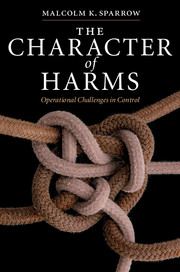Crossref Citations
This Book has been
cited by the following publications. This list is generated based on data provided by Crossref.
Plibersek, Ray
and
Mills, Alexandria
1970.
Is monitoring implementation the key to preventing repeated workplace corruption?.
Commonwealth Journal of Local Governance,
p.
153.
Edwards, Adam
and
Levi, Michael
2008.
Researching the organization of serious crimes.
Criminology & Criminal Justice,
Vol. 8,
Issue. 4,
p.
363.
2009.
Publications Received.
Contemporary Sociology: A Journal of Reviews,
Vol. 38,
Issue. 1,
p.
102.
Dougherty, George W.
and
Miller, David Y.
2010.
Municipal Managers: Regional Champions or Agents of Parochialism?.
Journal of Public Affairs Education,
Vol. 16,
Issue. 3,
p.
451.
Pritchett, Lant
Woolcock, Michael
and
Andrews, Matthew
2010.
Capability Traps? The Mechanisms of Persistent Implementation Failure.
SSRN Electronic Journal,
Kyrtsis, Alexandros-Andreas
2010.
Financial Markets and Organizational Technologies.
p.
189.
Pink, Grant
2010.
Environmental Enforcement Networks: A Qualitative Analysis.
SSRN Electronic Journal,
VAN DER HEIJDEN, JEROEN
2011.
Friends, Enemies, or Strangers? On Relationships between Public and Private Sector Service Providers in Hybrid Forms of Governance.
Law & Policy,
Vol. 33,
Issue. 3,
p.
367.
João, Elsa
Vanclay, Frank
and
den Broeder, Lea
2011.
Emphasising enhancement in all forms of impact assessment: introduction to a special issue.
Impact Assessment and Project Appraisal,
Vol. 29,
Issue. 3,
p.
170.
Quirk, Barry
2011.
Re-imagining Government.
p.
143.
Howe, Gavan
2011.
Why men work live and what you can do to curtail this deadly practice.
p.
1.
Coslovsky, Salo V.
2011.
Relational regulation in the Brazilian Ministério Publico: The organizational basis of regulatory responsiveness.
Regulation & Governance,
Vol. 5,
Issue. 1,
p.
70.
Kyrtsis, Alexandros-Andreas
2011.
Insurance of Techno-Organizational Ventures and Procedural Ethics: Lessons from the Deepwater Horizon Explosion.
Journal of Business Ethics,
Vol. 103,
Issue. S1,
p.
45.
Prpich, George
Evans, Jens
Irving, Phil
Dagonneau, Jérôme
Hutchinson, James
Rocks, Sophie
Black, Edgar
and
Pollard, Simon J. T.
2011.
Character of Environmental Harms: Overcoming Implementation Challenges with Policy Makers and Regulators.
Environmental Science & Technology,
Vol. 45,
Issue. 23,
p.
9857.
Van Gelder, Meagan
and
Dougherty, George W.
2012.
Do Students with Experience KnowThatMuch More? Assessing In-Service and Pre-Service Differences in Public Administration Students.
Journal of Public Affairs Education,
Vol. 18,
Issue. 2,
p.
349.
Pritchett, Lant
Andrews, Matthew
and
Woolcock, Michael
2012.
Escaping Capability Traps Through Problem-Driven Iterative Adaptation (PDIA).
SSRN Electronic Journal,
Hermans, Marijke A.
Fox, Tessa
and
van Asselt, Marjolein B. A.
2012.
Handbook of Risk Theory.
p.
1093.
Pithouse, Andrew
Broadhurst, Karen
Hall, Chris
Peckover, Sue
Wastell, Dave
and
White, Sue
2012.
Trust, risk and the (mis)management of contingency and discretion through new information technologies in children’s services.
Journal of Social Work,
Vol. 12,
Issue. 2,
p.
158.
Sieber, Joan E.
2012.
Witnesses to Research Wrongdoing.
Journal of Empirical Research on Human Research Ethics,
Vol. 7,
Issue. 5,
p.
3.
Taylor, Christopher
Pollard, Simon
Rocks, Sophie
and
Angus, Andy
2012.
Selecting Policy Instruments for Better Environmental Regulation: a Critique and Future Research Agenda.
Environmental Policy and Governance,
Vol. 22,
Issue. 4,
p.
268.





